HP Phoenix h9-1120t System Review: HP's Gaming Desktop Round Two with Tahiti and Ivy Bridge
by Dustin Sklavos on June 19, 2012 8:15 PM EST- Posted in
- Systems
- Gaming
- AMD
- HP
- Ivy Bridge
- Radeon HD 7000
- Phoenix
- Tahiti
Application and Futuremark Performance
While I found the HP Phoenix fairly compelling on the first go, things are more difficult this time around. The Phoenix gets a small boost from Ivy Bridge, but our review unit is running off a single mechanical hard disk where most other review units we've received have enjoyed SSDs. That's going to cause the PCMark scores to take a hit. Naturally, you can add your own if you'd like, but that's another $200 or so for 240GB+ SSDs.
The other hit is going to be in the overclock, or lack thereof. The Phoenix has no overclock of any kind on the otherwise overclock-friendly i7-3770K, making the liquid-cooling for the CPU feel more for show than anything practical.
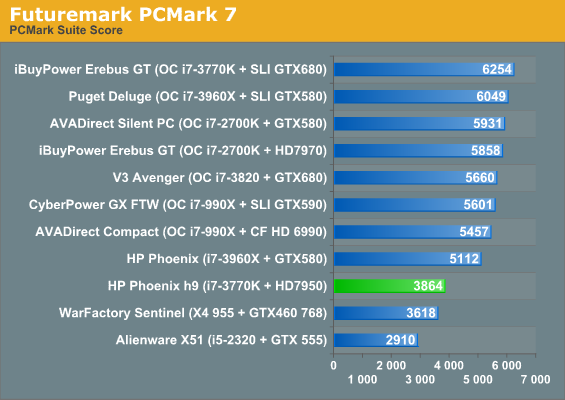
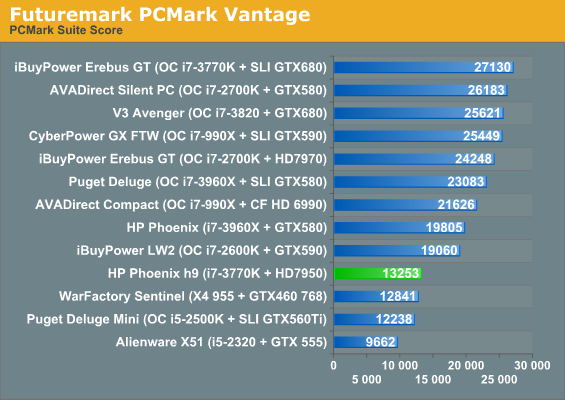
Without an SSD or an overclock, the Phoenix h9 flounders to near the bottom of the pack. Yet we know that PCMark skews heavily towards SSDs, so let's see what happens when we shift the focus to more CPU-oriented tasks.
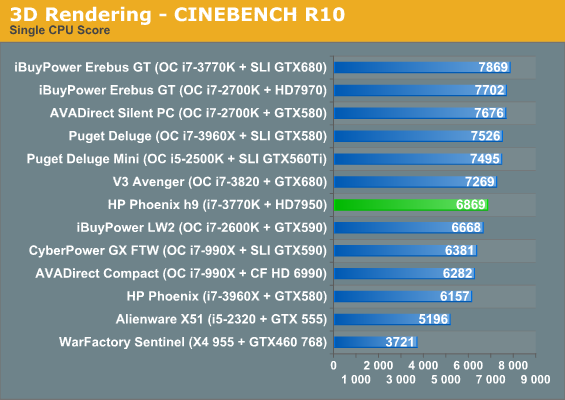
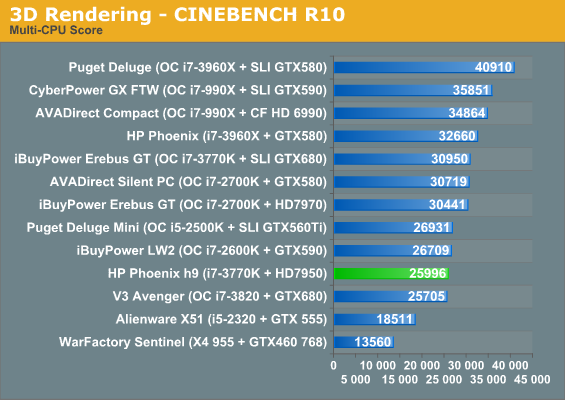
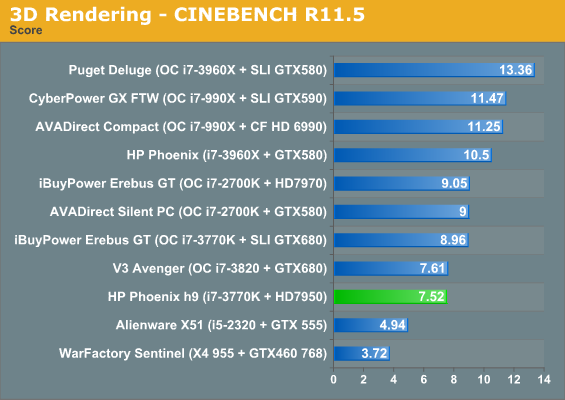
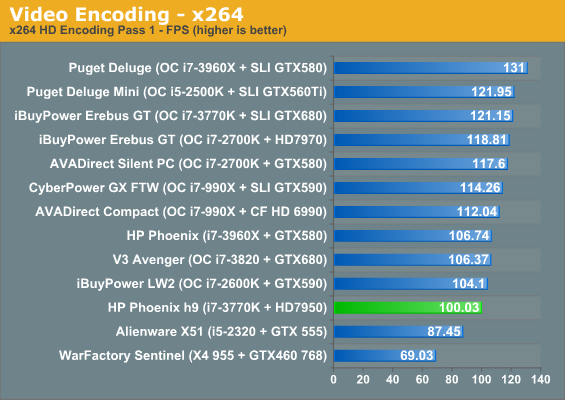
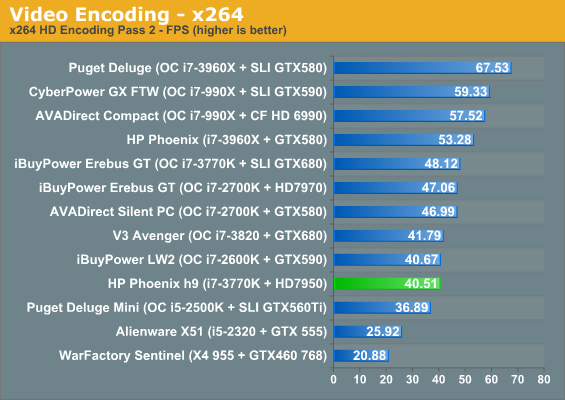
Without any kind of overclock, the Phoenix h9 puts in a very weak showing compared to our other gaming desktops. Note that boutiques charge a very small fee to overclock the systems they build, but that fee results in a tangible performance improvement that was also in some cases even measurable in gaming scenarios.
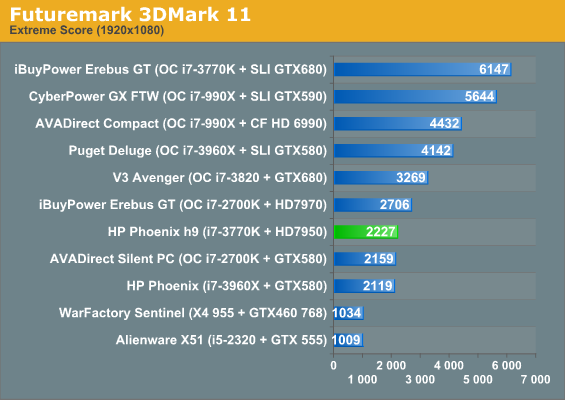
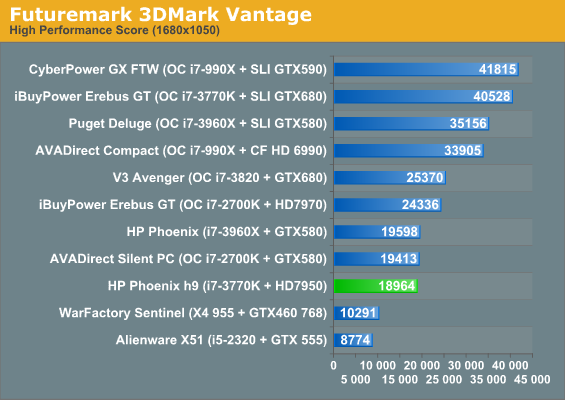
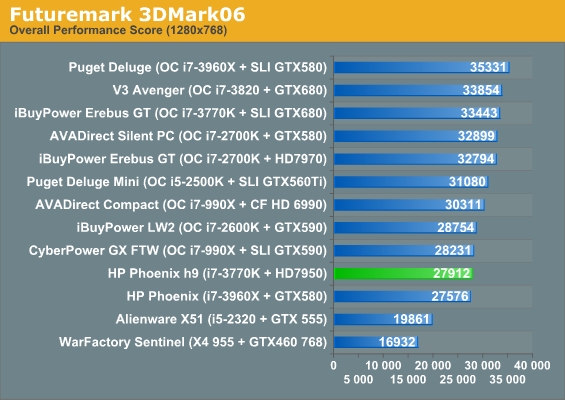
I want to be more forgiving of the Phoenix h9 in gaming scenarios where it's often competing with multi-GPU solutions, but it has a hard time breaking away from even a single last generation GeForce GTX 580. Keep in mind that the Radeon HD 7950 is as fast as any of the Phoenix models will get, too, due to the thermal constraints of the small chassis. Hopefully real world gaming benchmarks will be kinder....










33 Comments
View All Comments
quiksilvr - Wednesday, June 20, 2012 - link
I think the question you should be asking is: "Why are the best functioning computer cases so fucgly?"Wolfpup - Monday, July 23, 2012 - link
Compared to what? I think this is an attractive design-far more so than most if not all boutique systems.duffman55 - Tuesday, June 19, 2012 - link
HP's website says they're doing free upgrades from 8GB of memory to 10GB of memory with 3 DIMMs. Seems kind of odd that they would use an odd number of sticks. What sort of effect does this have on performance in this day and age?RaistlinZ - Wednesday, June 20, 2012 - link
It's because OEM's like HP don't know what the hell they're doing when it comes to high end gaming rigs. 3 DIMMS is silly, obviously. And for that price there really should be at least a 60GB SSD for the OS, 1600 DDR instead of 1333, at least a moderate overclock on the CPU, and a 7970 instead of a 7950.ggathagan - Wednesday, June 20, 2012 - link
3 DIMMS might be more than silly; it might be detrimental to performance.I don't know about the Z75 chipset, but many of the chipsets out there revert to single channel memory control when the DIMMS aren't in pairs.
Denithor - Wednesday, June 20, 2012 - link
Nah, ever since the Nehalem days CPUs have been able to use a hybrid channel memory setup if you use odd numbers of sticks.The matched pair will run in dual channel mode, the single stick will run single channel. Still faster overall than entirely single channel mode.
But yeah, that's basically a moronic 'upgrade' from HP for a system intended as a 'performance' class computer.
ShieTar - Wednesday, June 20, 2012 - link
My guess? It breaks Dual-Channel mode, drives up power consumption by about 5 to 10 W (not just the stick, the CPU will use more power too), and do absolutely nothing for your performance unless by chance you manage to use more than 8 but less than 10 GB of memory. Hint: Gaming won't use more than 8 GB for a long time to come.This seems very much like advertising acted on this "special offer" without consulting engineering about it.
RDO CA - Wednesday, June 20, 2012 - link
why all the 2.0 ports and I think you meant 22nm processor--1333 memory and no ssd??Come on HP you can do better.
JarredWalton - Wednesday, June 20, 2012 - link
The bandwidth requirements for USB 3.0 are quite steep, and the Z77 chipset only supports up to four USB 3.0 ports natively. If you want more USB ports, you either use USB 2.0 or you have to add a second USB 3.0 controller, which requires PCIe lanes that you might not have. Besides, mice, keyboards, and many other devices have no need of the bandwidth offered by USB 3.0.I'm not sure what you mean by the other comment: "I think you meant 22nm processor--1333 memory and no ssd??" If you're simply saying HP should have done better on the RAM and storage, I'd agree; maybe you're just responding to some other post?
Pennanen - Wednesday, June 20, 2012 - link
Just built similiar system for a friend month or 2 ago, even tough it had i5 2500k but otherwise pretty much the same. Total cost ended up 1100$.Prebuilts are very overpriced but this one does it even harder.